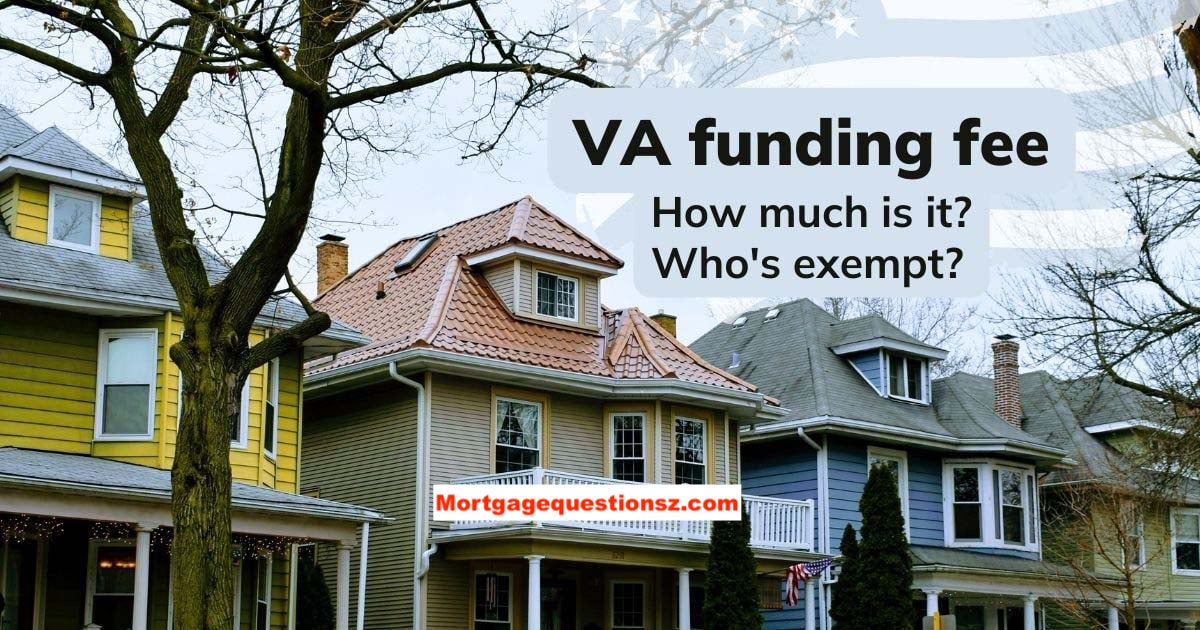VA Funding Fee is a one-time payment that helps lower the cost of a VA Loan since the VA Mortgage loan program does not require a Down Payment or Mortgage Insurance. The amount of the fees is determined by the Loan’s size whether the homebuyers already have VA Loans and their service history. The U.S. Department of Veterans Affairs VA Mortgage Loan program is designed to help Military service members, veterans, and their families enjoy low enjoy low-interest rates and No Down Payment on qualified mortgages, while also eliminating the need to purchase Private Mortgage Insurance (PMI).
The VA Funding Fee is a one-time fee that is charged to Borrowers who use their VA Mortgage Loan benefits to finance the purchase of a Home. This fee is paid to the VA and is used to help offset the costs of providing the generous benefits that the VA Mortgage Loan program offers. Military borrowers typically pay a one-time VA Funding Fee to help offset taxpayers’ cost of mortgage loans backed by the U.S. Department of Veterans Affairs. VA Mortgage Loans are attractive Mortgage Options for eligible Veterans, Active duty service members, and eligible surviving spouses. These Mortgage Loans come with competitive interest rates and No Down Payment or Mortgage Insurance Requirements.
The VA Funding Fee supports the VA Mortgage Loan programs so that these Mortgages can remain low-cost and available to future veterans and military service members. As a result, VA Mortgage Loans offer some of the best benefits in today’s real estate market including low-interest rates, zero Down Payment, and no Private Mortgage Insurance. VA Mortgage Loan could be a great financing option for Veterans looking to become Homeowners. These Mortgage Loans often allow active and former service members to buy homes without making down payments or paying Mortgage Insurance.
What Is VA Funding Fee?
The VA Funding Fee is a one-time administrative charge paid to the Department of Veterans Affairs. Due to the time the Loan closes, the VA Funding Fee supports the VA Loan programs, helping VA Mortgages remain low-cost and available to help future veterans attain homeownership. With support from the VA Funding Fee, the Mortgage Lenders can provide the service members or their survivors with some of the best rates and Mortgage Loan Terms available. The VA Mortgage Loans are issued by private banks and lenders, but they are partially backed by the Department of Veterans Affairs.
That means if the borrower fails to repay the Mortgage loan, the Federal Government pays the portion of those funds so that the issuing lender is not out the entire remaining balance. The VA Mortgage Loan includes a fee charged to most borrowers called the VA Funding Fee. This fee gets sent directly to the Department of Veterans Affairs. The VA Funding Fee helps the VA cover lenders’ losses. If a borrower defaults the VA can step in and pay off a portion of the loan. The fee also provides the VA with funding that it can put towards other costs.

How Does the VA Funding Fee Work?
- Eligible homebuyers are required to pay the VA Funding Fee once per the VA Mortgage Loan.
- The purpose of the VA Funding Fee is to sustain the VA Loan Program for further military Homeowners.
- The VA Funding Fee is applied to every VA purchase loan, Native American Direct Loan (NADL), Interest Rate Reduction Refinance Loan (IRRRLs), and Manufactured home loans with few exceptions.
- The VA Funding Fee amount can fall between 0.5% and 3.3% of the total loan amount.
How Much Does VA Funding Fee Cost?
The VA Funding Fee costs vary based on multiple factors and range from 0.5% to 3.3%. If a homebuyer is eligible for the VA Mortgage Loan, There will be three key factors that determine the cost of the homebuyer’s VA Funding Fee:
- The Total amount the homebuyers are borrowing.
- How much money do homeowners choose to use for a Down Payment.
- Whether a homebuyer has ever had a VA-backed Loan in the past. In this case, the new VA Loan is most often referred to as subsequent use.
The VA Funding Fee is expressed as a percentage of the Loan amount. For regular Military borrowers with no Down Payment, the VA Funding Fee is 2.3%. This fee increases to 3.6% for borrowers with previous VA Loans. For those homebuyers with a Down Payment of 5% to 9% the VA Funding Fee is 1.65%. Any loans with a Down Payment of 10% or higher will include the VA Funding Fee of 1.4%.
How To Pay the VA Funding Fee?
The VA Funding Fee is due at the time the Loan closes. Homebuyers can pay the VA Funding Fee in a couple of different ways. The VA Funding Fee is considered a closing cost so it is due at the time of closing. the eligible homebuyers can pay it to their mortgage lenders, who send it to the VA on their behalf. Here are some options to pay the VA Funding Fee:
- Eligible homebuyers can pay the VA Funding Fee upfront as a closing cost.
- The homeowners can roll the VA Funding Fee into their loan balance so that they don’t have to pay upfront. This will increase the size of their loan but may be more feasible for the homebuyers than paying several thousand dollars upfront.
- The homebuyers can ask the seller to pay the VA Funding Fee as a seller concession. Though VA rules dictate the sellers can’t pay costs on behalf of the buyers that exceed 4% of the total loan, the VA Funding Fee is considered an exception to this rule.
How to Exempt from the VA Funding Fee?
Several Veterans are not required to pay the VA Funding Fee. Eligible homebuyers are exempt from the fee if any of the following are applicable:
- The eligible borrowers are receiving compensation for a service-related disability.
- The eligible homebuyers are eligible to earn pay for a service-related disability, but they are receiving retirement or active-duty pay instead.
- On active duty and borrowers who have been awarded the Purple Heart.
- A service member, with a proposed or memorandum rating before the loan closing date, says the borrowers are eligible to get compensation because of a pre-discharged disability claim.
- A surviving military spouse whose partner died from a service-related disability, or died in service and they are receiving Dependency and Indemnity Compensation.
What Are the Pros and Cons of VA Funding Fees?
Here are some upsides and downsides of the VA Funding Fee.
Pros:
- The VA Mortgage Loans don’t require the Down Payment.
- No Private Mortgage Insurance (PMI) is required with VA Mortgage Loans.
- VA Mortgage Loans offer more favorable terms such as interest rates, and creditworthiness requirements than traditional loans.
- The VA Funding Fee contributes to accessible homeownership for other military Taxpayers.
Cons:
- With a Down Payment of less than 5%, the VA Funding Fee is 2.15% of the loan amount.
- VA Funding Fee increases if the homebuyers use it on a Second VA Loan.
- For cash-out refinance loans, the VA Funding Fee is 2.15% for the first-time use.
Frequently Asked Questions (FAQs)
Question 1: How is the VA Funding Fee calculated?
Answer: The VA Funding Fee costs will be based on the loan type, Down Payment, and whether this is the borrower’s first VA Loan. The homebuyers can reduce their VA Funding Fee by putting down a larger down payment.
Question 2: Is the VA Funding Fee Tax-deductible?
Answer: Yes, the eligible homebuyers can exempt the amount they paid for the VA Funding Fee along with mortgage interest on their taxes. However, if the homebuyers roll out the VA Funding Fee into their mortgage, they can only deduct the amount they paid that year. if the homeowner paid the entire amount upfront, they can deduct an entire amount for that same tax year.
Question 3: Can I get a Refund if I have already paid the VA Funding Fee?
Answer: Yes you can request the VA Funding Fee refund if your disability claim was in process before your loan closed. You will need to contact the VA regional loan center in your area for details.
Question 4: What are other closing costs for VA Loans besides the VA Funding Fee?
Answer: As with any VA Loan, The VA Mortgage Loan comes with closing costs like origination fees, recording fees, and the cost of title insurance. These costs vary depending on the Mortgage Lenders and what the seller is willing to cover.
The Bottom Lines
Most Homebuyers have to pay the VA Funding Fee when they take out a VA Mortgage Loan, adding to the overall cost of the loan. However, the VA Funding Fee reduces the burden on taxpayers and allows VA loans to continue to offer excellent benefits like no down payment requirements. The VA funding fee is a one-time fee paid at loan closing or rolled into the total cost of the Mortgage Loan, alongside the origination fee and any other closing costs.
